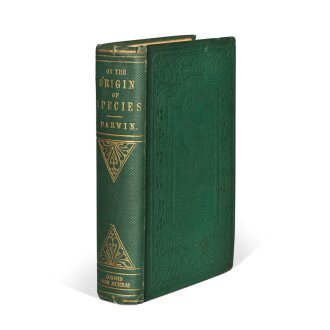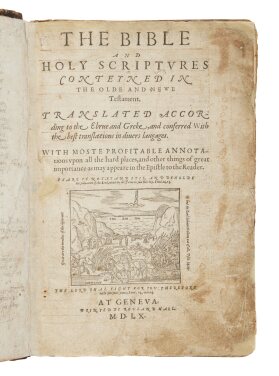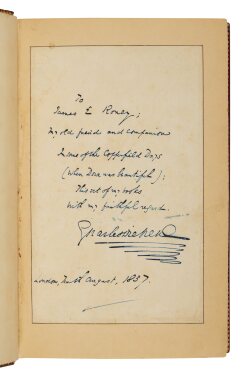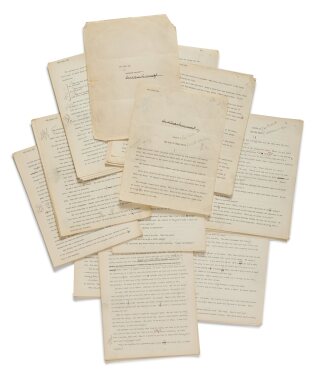T his July, Sotheby’s is presenting a two-part auction of fine books and manuscripts, culminating with a live auction on 21 July at 10 am. Both sales offer an array of exceptional material, with the first part alone including William Shakespeare’s “The First Folio,” the official record of Virginia’s ratification of the US Constitution an autographed manuscript of Bob Dylan’s “Subterranean Homesick Blues” and more. It is rare for a single sale to include such a range of truly extraordinary lots, each representing a high point in its respective field.
“The First Folio” of William Shakespeare

It would be difficult to imagine a work of literature more iconic than the first collected edition of William Shakespeare’s plays — now commonly referred to as “The First Folio” — published in 1632. It is arguably the most important book in English Literature and, along with the King James Bible published just a few years earlier, one of the two greatest books of the English language.
“The First Folio” contains thirty-six of Shakespeare’s plays, half of which had never been printed before that point. The editors omitted two collaborative plays, Pericles and The Two Noble Kinsmen, likely because they were not solely Shakespeare’s work or because there were problems with the texts or their rights. Except for three pages of Sir Thomas More, now held in the British Library, probably no contemporary manuscripts or prompt copies of any of Shakespeare’s plays survive. Without the “Folio,” therefore, Shakespeare would be considered half the man he is today as eighteen plays might have been lost.
It is now thought that no more than 750 copies of “The First Folio” were printed. Of these, 219 copies are recorded as extant in known locations. The present copy is further distinguished by its early Scottish provenance. It boasts seventeenth-century manuscript annotations and doodles, accomplished in at least five different hands. The compelling marginalia include fragments of prayers and some doggerel verse, but the only response to Shakespeare’s text is in the marking of three speeches in Julius Caesar.
The Official Record of Virginia’s Ratification of the US Constitution

This engrossed and attested copy of Virginia’s ratification of the United States Constitution — together with two sets of amendments to the Constitution proposed by the Virginia Convention — was evidently one of only three copies to survive from a set of twelve. Each was intended to be sent to the other state governors or legislatures to gain support for a Bill of Rights.
The Virginia Ratification Convention met for twenty-three days in June 1788. The 170 delegates included founding fathers from the Old Dominion — among them James Madison, George Mason, James Monroe, Benjamin Harrison and John Marshall. While the Convention approved the US Constitution unconditionally, it also submitted to Congress and the other states a lengthy series of proposed amendments, whose ideas and concepts are echoed unmistakably throughout the Bill of Rights as we know it today. Of the first ten amendments to the Constitution, I, II, III, IV, V and VIII have their direct antecedents — and often their precise wording — within the present manuscript, while the others animate and confirm the sentiments expressed by the Virginia Convention.
This official record of Virginia’s ratification, containing in its proposed amendments the nucleus of the Bill of Rights, placed the fledgling United States on a sure and secure footing.
An Autographed Manuscript of the Lyrics to Bob Dylan’s “Subterranean Homesick Blues”

In the vein of unparalleled lyricism — and indeed, an indomitable spirit of independence — the auction is rounded out by Bob Dylan’s autograph manuscript lyrics for “Subterranean Homesick Blues,” an important working draft of one of his most iconic songs from his most fertile period. “Subterranean Homesick Blues” was immediately provocative. From the riff’s overt homage to Chuck Berry’s “Too Much Monkey Business” to the pastiche of drug references, slang, deliberate nonsense and jeers at the establishment, the eruption of Dylan’s electric debut at the beginning of Bringing It All Back Home defied every expectation and solidified the former folk hero’s status as a leader of the emergent counterculture.
That this manuscript survived at all is remarkable, given Dylan often failed to keep track of his work-in-progress. Biographer Clinton Heylin notes that “for the uniquely fecund fifteen-month period in which Dylan essentially wrote and recorded Bringing It All Back Home, Highway 61 Revisited and Blonde On Blonde, we are reliant on scraps ... rescued from the fire of Dylan’s imagination.” Heylin claims that Dylan “misplaced all but one of the notebooks from this era, though he used them frequently.” Given that so much of the material that led to these recording sessions was lost, the present manuscript is a truly rare and spectacular record of Dylan’s process at this time.

While the draft closely conforms to the final lyrics, one can clearly see the singer deep in process. The manuscript opens with the now-famous first lines — “Johnny’s in the basement / Mixing up the medicine,” a reference to Woody Guthrie’s and Pete Seeger’s “Taking It Easy” — though a marginal notation reveals another possibility Dylan was toying with: “Johny in a fist fight / Woke up appetite.”
Through the sound of Dylan’s rebellion and his relentless, spitfire lyrics, the song has, as with all of his greatest achievements, transcended its immediate context and continues to speak to the present. “Subterranean Homesick Blues” gave voice to the spirit of the time, and its lyrics have since shaped how we imagine American disenchantment. As the poet Claudia Rankine said of Dylan on the day that he was awarded the Nobel Prize for Literature, “His words are in all our mouths.”




![View 1 of Lot 1011: [Fitzgerald, F. Scott — The Great Gatsby] | “So we beat on, boats against the current, borne back ceaselessly into the past.”](https://sothebys-com.brightspotcdn.com/dims4/default/fc6c8d6/2147483647/strip/true/crop/6407x4925+0+0/resize/330x254!/quality/90/?url=https%3A%2F%2Fsothebys-md.brightspotcdn.com%2F5c%2F25%2Fe380e3b3417ba27d1204a4387239%2F107n10963-cb7nj-01.jpg)
![View 1 of Lot 1007: [Austen, Jane] | An important association copy of Austen's most beloved novel](https://sothebys-com.brightspotcdn.com/dims4/default/10469bb/2147483647/strip/true/crop/1268x2000+0+0/resize/238x376!/quality/90/?url=https%3A%2F%2Fsothebys-md.brightspotcdn.com%2F53%2F34%2Fa064373b4efdad2f5cad4e3bcaaf%2F008n11123-c8qqs-t1-02.jpg)




![View 1 of Lot 1008: [Browning], Elizabeth B. Barrett | "...the first utterances of my individuality."](https://sothebys-com.brightspotcdn.com/dims4/default/c51992d/2147483647/strip/true/crop/1321x2000+0+0/resize/248x376!/quality/90/?url=https%3A%2F%2Fsothebys-md.brightspotcdn.com%2F2f%2Ff4%2Fc0bd14da4e938217421bf795c369%2F012n11123-c77gl-01.jpg)



